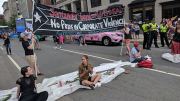 Over the weekend of January 28 & 29, more than two dozen federal officials met with representatives from the Puerto Rican group, Transexuales y Transgéneros en Marcha (TTM), and the Network for LGBT Health Equity to discuss the violation of human rights and lack of access to care for transexual women in Puerto Rico. Federal officials were concerned and sometimes shocked by the testimonies of violence and discrimination against the transexual community. For Sophia Isabel Marrero Cruz, a long time Puerto Rican activist and a transexual woman, the unprecedented attention towards Puerto Rico’s issues is the first step in a series of mobilization strategies for the respect of human rights in the island.
Over the weekend of January 28 & 29, more than two dozen federal officials met with representatives from the Puerto Rican group, Transexuales y Transgéneros en Marcha (TTM), and the Network for LGBT Health Equity to discuss the violation of human rights and lack of access to care for transexual women in Puerto Rico. Federal officials were concerned and sometimes shocked by the testimonies of violence and discrimination against the transexual community. For Sophia Isabel Marrero Cruz, a long time Puerto Rican activist and a transexual woman, the unprecedented attention towards Puerto Rico’s issues is the first step in a series of mobilization strategies for the respect of human rights in the island.
“We have been speaking out to the community as well reporting to the government on the murders and systemic beatings of trans women to the Department of Justice and Police Department of Puerto Rico. To date, none of the murders and beatings have been classified as hate crimes under the local laws, that is a big concern for the safety of the trans community, a slap in the face to the calls for justice for those victims of crimes, and message of apathy from our local authorities” said Ms. Marrero Cruz who is the spoke person of TTM, a community based organization from Puerto Rico that has been coordinating anti-violence watches since 2003.
Cruz, whose organization is a member of the Citizens Alliance for LGBTTA (lesbian, gay, bisexual, transexual, transgender and ally) Health in Puerto Rico and the Network for LGBT Health Equity at The Fenway Institute in Massachusetts, was invited by the Network to D.C. to testify at a U.S. Health And Human Services Office of Civil Rights listening session. She was also able to attend Creating Change, the premier national LGBT civil rights conference. After initial meetings at Creating Change, federal officials worked quickly to assemble additional officials from the Department of Justice and the Health Resources and Services Administration to discuss violence and access to health care problems.
“The response was unprecedented, literally two dozen officials were assembled over the weekend to meet with us on Monday. Just as the challenges in Puerto Rico are a bellwether of LGBT stigma there, this response is a clear bellwether of how the administration wants to support even the most vulnerable among us” said Dr. Scout, Director of the Network for LGBT Health Equity at The Fenway Institute. “I could not have been more pleased with these meetings, I’m sure local changes will follow” added Ms. Cruz.
“We are very interested in smoking and wellness but this is an example of how these are just symptoms of an underlying problem” said Dr. Scout. “There have been eight murders in the last year alone. Puerto Rico is literally the epicenter of LGBT violence in the U.S. and trans women sometimes have to travel to New York to get health care. How can we expect to get traction on LGBT wellness until the issues of violence and basic healthcare are addressed?”
“The transexual community of Puerto Rico is eager to put an end to these issues; they are doing amazing advocacy and mobilization work. While they have few resources such as phone, internet, transportation or even office space, they are committed to putting Puerto Rico’s issues on the map and in front of Federal authorities. We call to all human rights, LGBT organizations, and foundations to provide all needed resources and support to our trans sisters in Puerto Rico” said Yanira Arias, Director of Community Organizing of the Latino Commission on AIDS and long time supporter of TTM and the LGBTTA Alliance.
A note about terminology: In Puerto Rico, the word transexual is used to refer to a person whose gender identity differs from their assigned sex at birth. Transexual people may or may not decide to alter their bodies hormonally and/or surgically. Puerto Ricans use the word transgender to refer to people who adopt the dress or manner of the opposite sex but are not interested in transitioning their gender. The terms in this press release reflect those usages.
The Network for LGBT Health Equity is a program of The Fenway Institute at Fenway Health. For more than forty years, Fenway Health has been working to make life healthier for the people in our neighborhood, the LGBT community, people living with HIV/AIDS and the broader population. The Fenway Institute at Fenway Health is an interdisciplinary center for research, training, education and policy development focusing on national and international health issues. More online at www.fenwayhealth.org.






